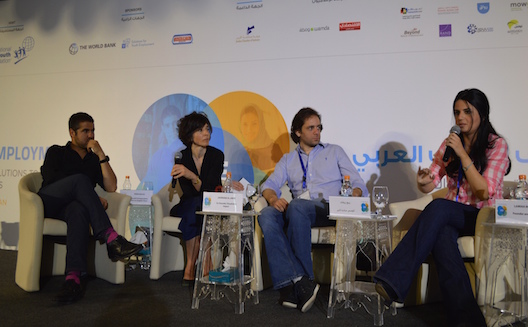Second Arab Youth Employment Conference discusses solutions to the region


Nabih Bulos, special correspondent, LA Times; Joumana Al Jabri, cofounder, Visualizing Impact; Rabee Zureikat, founder, Zikra Initiative; and Lamiaa Bounahmidi, founder & CEO Chez LOOLY'S speak at the AYE conference. (Images via Tala el Issa)
The recently-concluded Arab Youth Employment (AYE) conference, held in Amman on April 28 - 30, sought to find solutions to longstanding youth unemployment in the Middle East.
The conference included many workshops and panel discussions that covered a variety of subjects, like career guidance, the utilization of technology to facilitate access and communication, and developing inclusive and social business models.
The event was organized by Silatech, a Qatari initiative founded in 2008, which aims to find solutions for the region’s challenges, and to foster sustainable, positive change for Arab youth.
The subject of youth employment came into focus after Tunisian vendor Mohamed Bouazizi declared “I am a simple man. I don’t want anything. I just want to work,” before he immolated himself in protest of the way police treated him, an act that sparked protests in Tunisia and reverberated across the Arab world.
While revolutions might be the first step to economic reform, the youth unemployment rate in the Arab region increased from 24 percent in 2009 to 29 percent in 2014, which is the highest rate in the world, according to AYE.
Nearly 60 experts from a various fields were invited to speak at the AYE conference. Speakers included politicians, academics and entrepreneurs.
One of the most hotly discussed solutions was entrepreneurship.
“There is a mismatch between the demand and supply in the Arab job market,” said Noura Kamel, Silatech’s policy program manager. “We need young people who will create jobs for themselves and others. It’s no longer the dependent relationship whereby someone graduates and they either queue up for a public sector job… or they go to the private sector.”
The diversity of attendees and speakers helped spark constructive, frank and critical dialogue.

Kamel Al-Asmar, founder, Nakhweh; Saed Shela, CEO & founder, Social Dice; Emile Cubeisy, managing partner, Silicon Badia Ventures; Ibrahim Safadi, CEO, Luminus Education; Nasser Saleh CEO & founder, Madfoo3atCom speak on the Private Sector Driven Solutions panel.
For example, during a panel discussion on social entrepreneurship the speakers criticized the concept of employment that in their view categorizes jobs by orientalist and capitalist standards, where some jobs are “better” or more “civilized” than others. This mentality, they argued, has forced Arab youth to conform to stereotypes society demands of them.
Rabee Zureikat, founder of Zikra Initiative, which aims to change the community service model to one of exchange where both parties give and take, believes that instead of solving unemployment by adding western exterior elements to Arab youth’s environments or relocating them in big cities and large corporations, it is more important to help young people appreciate the resources that already exist in their surroundings and to encourage them to create their own job opportunities accordingly, whether it is farming, crafting, grazing or anything other industry. He objects to the labeling of such professions as backwards and uncivilized.
Similarly, Kamel argues that diminishing employment to mere statistics is not a solution. “Solutions for youth employment are not going to be solely economic. It’s not just about providing someone with a job. You want to provide them with a meaningful job… we care about jobs that are not just a number,” she said.


